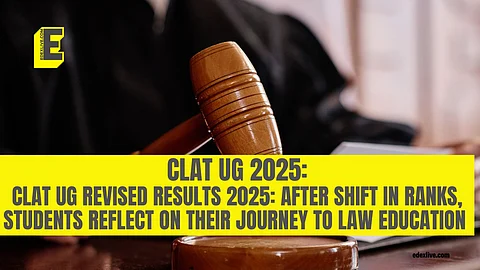

The Supreme Court’s latest verdict instructed the Consortium of National Law Universities to republish the final list of selected candidates within four weeks, which could shift the candidates' ranking by 1.25 marks.
The consortium officially released the revised results on May 17, following the apex court's directives to address the errors. Following the revised results, the counselling registration concluded on May 21.
The CLAT UG students who went through the arduous wait for the revised results share their experiences and how this confusion impacted them.
“I was very unhappy with the Supreme Court’s intervention,” said G Harshath Guptha from Visakhapatnam, Andhra Pradesh. However, he added that he was glad that someone had taken a stand and challenged the system to ensure a fair paper setting.
On the other hand, Arundhathi R Madhavan, from Malappuram, Kerala, said she held a neutral opinion on the judgment, as she knew that there wouldn’t be major changes in the ranking.
Contrary to both, Sharmila Keelu, from Visakhapatnam, expressed disappointment in the Supreme Court’s prolonged legal proceedings. She had expected the verdict to be announced a bit sooner, as it would have helped her in deciding on her future plans.
When asked if the revised results impacted their ranks, Harshath said, “After the declaration of the revised results, my rank dropped from 6432 to 8790. This rank is insufficient for getting admission into any top NLUs.” He added that his score dropped by 1.75 marks, which made a huge difference.
Arundhathi agreed, mentioning that her rank had decreased by a margin of 1000 in comparison to the previous rank. She expressed frustration that despite her score having increased by 1.25 marks, the overall rank fell significantly. But for Sharmila, the revised results did not make much difference personally, but she observed that many of her friends experienced major shifts in their ranks.
Sharmila shared that the prolonged legal proceedings left her in a dilemma about whether to pursue long-term preparation. Harsharth, meanwhile, expressed his disappointment, saying he had at least hoped to get into Tier-III universities, but he has now lost all hope. He added that many of his friends have also lost faith in the consortium; while some went on to join private universities, others changed their career options altogether.
On being asked if this incident affected their trust in CLAT exams or in the Consortium of NLUs, Harshath replied that this incident has caused him to lose trust in the Consortium of NLUs. He added that he is fed up with the governing council, pointing out that the governing council should be formed through a transparent election process and not through the annual governing body meeting, which ensures their trust in the governing body.
Sharmila pointed out that the delay in corrections with the answer key has caused her to lose trust in the NLUs.
Arundhathi also expressed her unhappiness when she said the six-month-long legal proceedings forced her to lose hope in the consortium, and she went on to join a private university instead of waiting for the final verdict.
When asked for suggestions to be adopted by the consortium to prevent such issues in the future, Sharmila adds, “The next year’s CLAT question paper must be framed clearly; it should be designed according to the mindset of a 17-year-old,” highlighting that before releasing the answer key, it must be examined by an expert committee.
In agreement, Arundhathi quickly adds, “The consortium should adapt and stick to a more transparent method. They should adopt a standardised way of setting the question paper.” Harshath also acknowledges that the consortium should conduct multiple checks for any mistakes before releasing the question paper or the answer key.
For future CLAT aspirants, both Arundhathi and Harshath offered suggestions on how one should begin preparations early. While Arundhathi emphasised the importance of keeping track of the Supreme Court’s verdicts and staying updated on current affairs and legal knowledge, Harshath warned that next year’s question paper could be tougher, given the current issue, so he urged the aspirants to prepare diligently.
